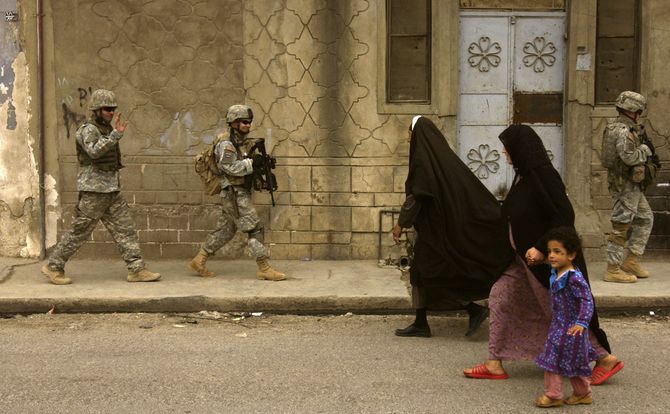The logical response to failed interventions
Far from showing ignorance, the decision to withdraw troops from Syria may be a sign the U.S. has learned from a long history of Western failure in the Middle East.

The irresponsible destruction of the Ottoman Empire at the end of World War I and its division into spheres of influence controlled mostly by the United Kingdom and France laid the groundwork for lasting instability in the Middle East. Gradually, other powers became involved, notably the Soviet Union and the United States. Owing to its central geographical position, the region acquired great strategic significance, while its oil and gas wealth made it a focus of world politics.
Over the next 100 years, changing coalitions and clashing ideologies ravaged the Middle East. While there is ample evidence that outside interventions – by the West and the Soviets alike – have consistently failed, it is still an article of faith among policymakers that Western intervention is necessary to pacify the area. This ignores the fact that it is the domain of ancient cultures perfectly capable of handling their own affairs.
Aggressive pattern
The Middle East’s most powerful regional players are Turkey, Iran, Saudi Arabia, Israel and Egypt. For a long time, antagonism toward Israel kept the Arab nations together, while Turkey was friendly and Iran more distant toward the Jewish state.
After its Islamic Revolution, Iran fell into the grip of a brutal system. Under astute leadership, the country became an assertive force, singling out Israel and Saudi Arabia as its regional adversaries.
Iran’s weapons were terrorist groups such as Hezbollah and proxy allies like the Houthi rebels in Yemen.
Iran’s weapons of choice were terrorist groups such as Hezbollah in Lebanon and proxy allies like the Houthi rebels in Yemen. Hezbollah continues to pose a mortal danger to Israel, while the civil war in Yemen directly threatens the Saudi kingdom. Tehran also sponsors Islamist movements throughout the Middle East, threatens Israel and the U.S. with war, and supports terrorist attacks in Europe.
This consistent pattern of aggression resulted in economic sanctions on Iran, which the international community hoped might discourage the regime from completing its fast-developing nuclear program.
Failed legacy
After more than three decades of hostility, President Barack Obama’s administration – perhaps naively – believed an accommodation could be reached between Iran and the West. This faith led to the Joint Comprehensive Plan of Action (JCPOA), an agreement between Iran and the five permanent members of the UN Security Council (China, France, Russia, the UK and the U.S.) plus Germany and the European Union.
Strikingly, none of Iran’s neighbors or regional rivals – Turkey, Saudi Arabia, Egypt and Israel – were included or consulted in the negotiations. Their aim was to at least delay Iran’s nuclear program in exchange for lifting economic sanctions. However, the nuclear deal did not oblige Tehran to stop supporting terrorist groups or to completely dismantle its weapons research facilities.
These shortcomings consigned the JCPOA to an already long list of failed international interventions in the Middle East, alongside support for the insurgencies of the so-called Arab Spring and policies toward Syria and Libya, to name a few. The issues that should have been the main Western concern – preventing Iran from becoming a nuclear power and combating international terrorism – were never adequately addressed.
The shameful failure to protect Christians in the region was a final proof of Western incompetence.
Sensible conclusion
Given this lamentable record, the American decision to pull out of the Middle East and specifically Syria makes sense. It is better to end a situation that cannot be handled.
What is vital for Europe and the U.S., however, is not to weaken the alliance built up between Saudi Arabia, the Gulf states, Egypt and Israel to counterbalance Iran. Turkey also has an important role to play and its national interests should be respected. In short, the region must find its own balance.
Europe is by no means freed from the obligation to act decisively against external threats.
That does not free Europe from the obligation – in its own self-defense – to act decisively against external threats. In this context, cyber-retaliation can be an effective response to governments that sponsor terrorist attacks against Europe. But that strategy will require improved cybersecurity if European states are to avoid damage to their own infrastructure. Europe should also consider it a duty to protect Christians in the Middle East.
These, however, are limited goals. The days of playing nationalities against each other or rearranging the Middle Eastern map through desktop engineering should be over – and good riddance.
